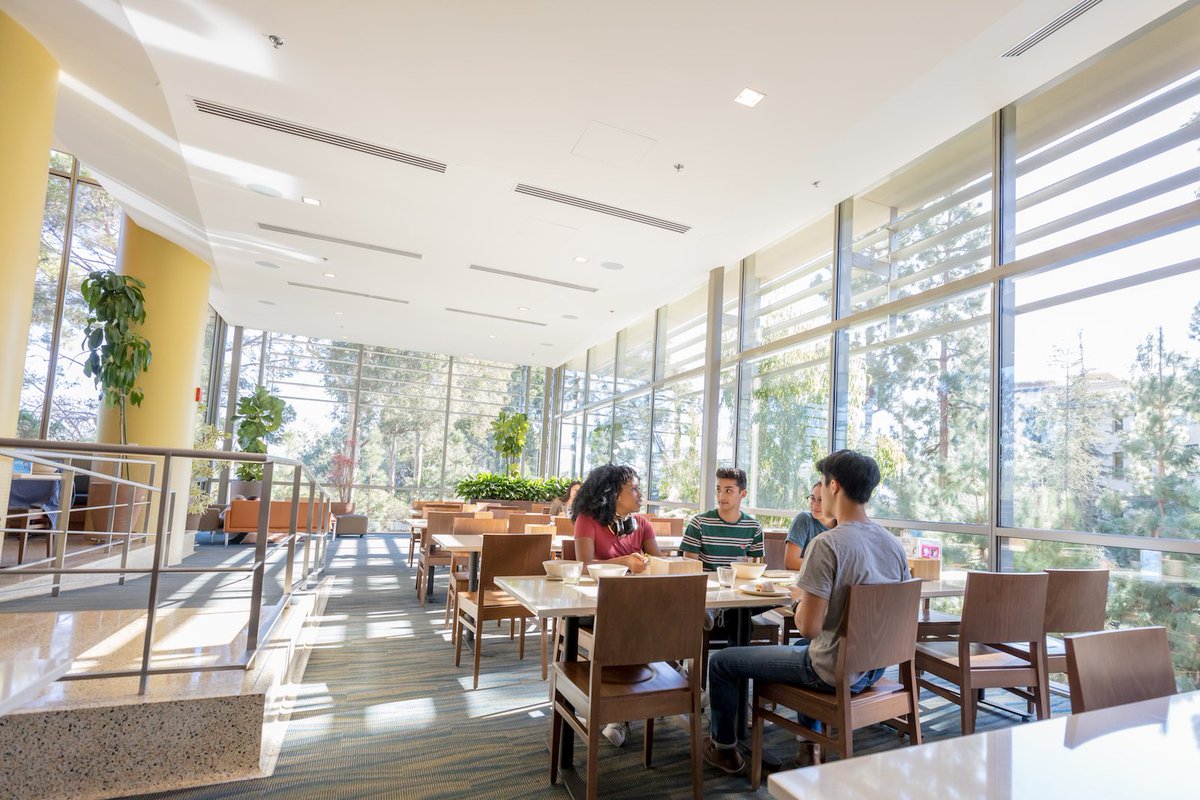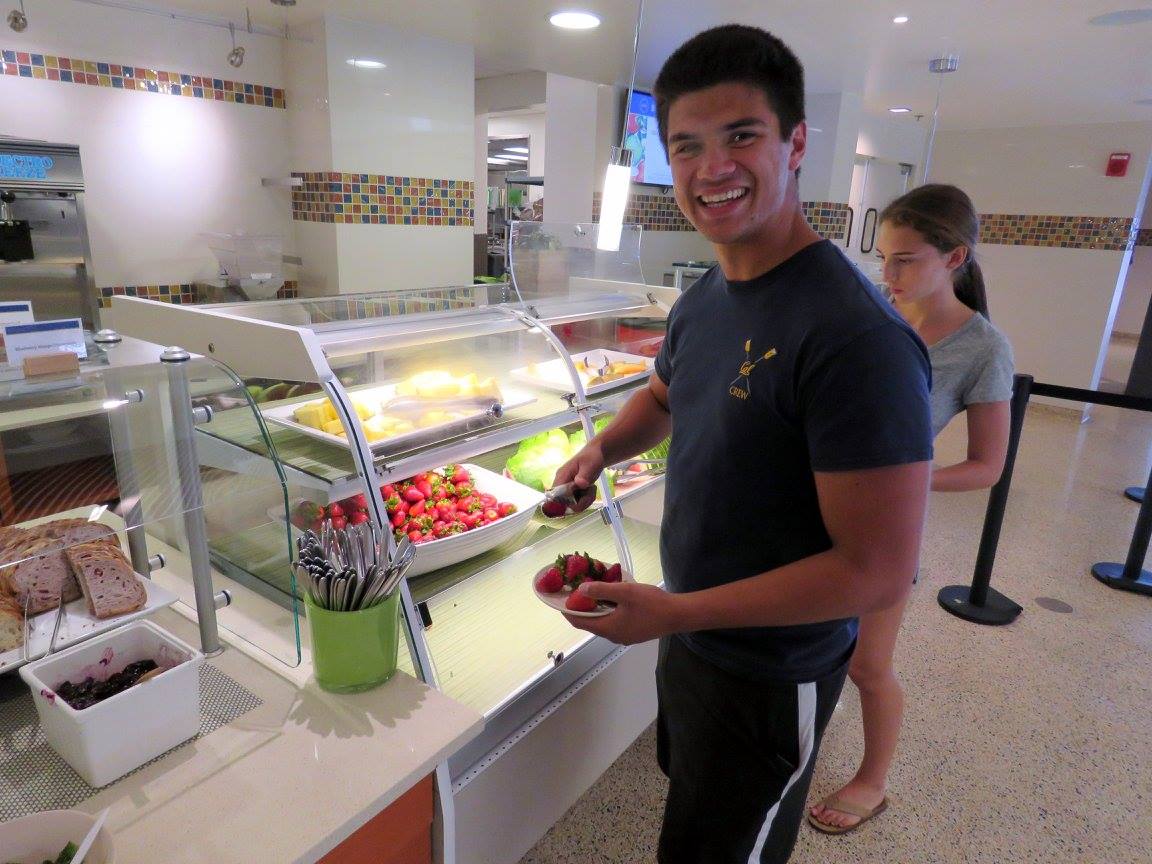UCLA Dining Services and Rooms Division have helped pave the way in reducing residential waste footprints on the Hill. Learn how Housing & Hospitality is incorporating sustainability into dining and waste management.
As part of the UC Policy on Sustainable Practices, UCLA Dining Services is committed to reaching or exceeding a minimum of 25% sustainable food and beverage purchases by 2030. Sustainable purchases include plant-based products, organic fruits and vegetables, and Fair Trade, Seafood Watch, and Rainforest Alliance certified products. Bruin Plate is one of the main dining halls that actively utilizes sustainable food products.


Did you know?
- Our dining menus include a carbon footprint scorecard. Look for the green earth symbol for low carbon foods and the red earth symbol for high carbon foods.
- Vegetarian and vegan meals are available every day at each residential restaurant and boutique. Look for the green earth symbols on the dining menu for low-carbon footprint, vegan, and vegetarian options.
- Almost all to-go packaging on the Hill is either compostable or recyclable. Learn how to sort your waste here!
- More than 50 tons of compostable materials are diverted from the landfill each month through a commercial composting program.
- Eating well and eating green often go hand-in-hand, learn more here!
- Learn more about Bruin Plate, UCLA’s Premier Residential Dining Restaurant!
Food Initiatives
- Food Donations
- Meatless Mondays
- Beefless Thursdays
- Cage-Free Eggs
- Impossible™ Foodprint
- Fair Trade Coffee
- Recycled Cooking Oil
UCLA Dining has a food tracking program that is used to calculate the amount of food that should be purchased to avoid excess food. But on occasions when there is excess food such as large student events or winter break, Dining Services donates leftover produce, prepared food, eggs, milk, and extra unopened products to LA Mission and Los Angeles Food Bank. Food that is collected throughout the year is donated to the Community Programs Office (CPO) Food Closet. There are also Food Closet donation boxes located at the front desks of residence halls and at Covel Commons to collect non-perishable donations.
In winter 2019, Dining Service partnered with several student organizations to create Bruin Dine, a program that takes leftover food from dining halls and serves it to the community. In winter and spring 2019, 773 pounds of food were recovered from dining halls and served to students and the UCLA community.
The Green Mondays campaign, also called Meatless Mondays, is designed to inform students about the impact of all meat production on the environment, from water to carbon dioxide emissions. Every Monday, one station at each dining hall serves non-meat options during lunch and dinner to promote sustainable eating.
In order to reduce the negative environmental impacts of beef production, Dining does not serve beef on Thursdays in the main dining halls.
What’s our beef with beef?
- Cows generate methane gas, which is a greenhouse gas that is 23 times more potent than carbon dioxide.
- It requires more than 1500 gallons of water to produce 1 pound of beef.
- Only 2.2 pounds of beef generate the same amount of carbon dioxide as an average car emits every 155 miles.
- Saturated animal fat in red meat also increases the risk of heart disease, atherosclerosis, and colon cancer.
UCLA Dining Services has committed to buying only cage-free and Certified Humane eggs for all residential restaurants. This commitment was made in April 2010, largely a result of efforts from Bruins for Animals. Dining Services purchases approximately 1.5 million Certified Humane eggs annually from Wilcox Farms.
The Impossible™ Foodprint Project pilot launched in Fall 2019 at Rendezvous West. In addition to introducing Impossible™ plant-based meat, the project aims to provide transparency about the carbon footprint (i.e., foodprint) of different menu items.
In acknowledgment of the social inequalities and environmental detriment involved in conventional coffee production and sales, UCLA Dining serves Royal Cup Coffee and Tea that is Rainforest Alliance Certified or Organic coffees. The Rainforest Certified Alliance group provides farmers and communities with infrastructure, buildings, clean hand washing stations, water wells.
Dining Services generates on average 400 gallons of used cooking oil each month. The used oil is picked up and recycled into biodiesel by a third party company.
Waste Initiatives
UCLA Dining hosts food waste audits at the dining halls a few times per quarter. During these audits, student volunteers help guests separate their plate leftovers between edible food, inedible food (bones, fruit rinds, etc.), napkins and liquids. These audits provide data on the amount of edible food that is being composted and engage guests on the environmental impacts of food waste.
On average, 50% of what is leftover is edible food, most often grains and starches. This equates to 150-250 pounds per meal per dining hall, or 2.5 oz of edible food waste per person.
These audits are staffed entirely by student volunteers, and we are always looking for further volunteers! If you are interested, please email sustainability@ha.ucla.edu
UCLA Dining Services and UCLA Catering have a recycling program which not only reduces the amount of waste sent to landfill but also conserves natural resources, saves energy, and reduces pollution. Campus wide, the UCLA Facilities Management Recycling Program recycles nearly 9 million pounds of materials generated annually by the entire UCLA community. Learn more and get answers to your recycling questions.
At all four residential restaurants—De Neve Dining, Bruin Plate, Covel Commons, and FEAST at Rieber—food scraps from food preparation (e.g. egg shells, vegetable trimmings, etc.) and the post-consumer waste (food left on plates) are separated from non-compostable waste and sent to a composting facility. Although this does not take the place of food waste reduction measures, this composting program significantly reduces the amount of waste we send to landfills.
As with the four Residential Restaurants, pre- and post-consumer food waste is collected in all Quick-Service Restaurants: Bruin Cafe, Rendezvous, Cafe 1919, Bruin Plate Grab & Go Breakfast, De Neve Grab & Go, and De Neve Late Night. In addition to the kitchen food trimmings, the post-consumer food waste is diverted to the composting bin by guests. All dining materials are compostable, except chip bags and condiment packets.
UCLA has been a Styrofoam-free campus since 2010 and all four take-out boutique restaurants on the Hill serve all food in compostable packaging. While Styrofoam is cheap and insulates well, the negative attributes are greater, making the removal of single-use Styrofoam an environmentally beneficial and healthy decision. The chief environmental and health issues include that it adds significantly to pollution, is never biodegradable, consumes non-renewable resources, and is classified as a probable human carcinogen. In an effort to curb even more harmful pollution, H&H is in the process of shifting all packaging to be marine biodegradable as well.
As of January 2020, UCLA has a Single-Use Plastics Policy that will transition the entire campus away from using single-use plastic products by 2023. UCLA Dining is at the forefront of this movement and will be switching to reusables or 100% fiber-based compostables in all the dining facilities on campus.
Single-use plastics have numerous negative impact on human and environmental health and the entire UC system has adopted this policy to try to mitigate our impact.
Tray-free dining is encouraged at every meal in all of our dining halls in order to reduce water usage. Over 50 universities now have a tray-less dining program in place. Many of these programs report a reduction in food waste generated, as well as reductions in energy and water consumption. Waste, water, and energy audits were performed during the Hedrick pilot in Winter 2009 – 6,300 gallons of water was saved in one month alone. Now, it is a part of the Bruin lifestyle!
Benefits of dining without a tray include:
- Using less energy for heating water
- Using less water for washing
- Using less cleaning product
- Reducing food waste
Beginning fall 2018, students can use their own reusable bottles to get drinks at Rendezvous, Bruin Cafe, and Cafe 1919. You save 0.24 lbs. of CO2 every time you use a reusable cup instead of a disposable one!